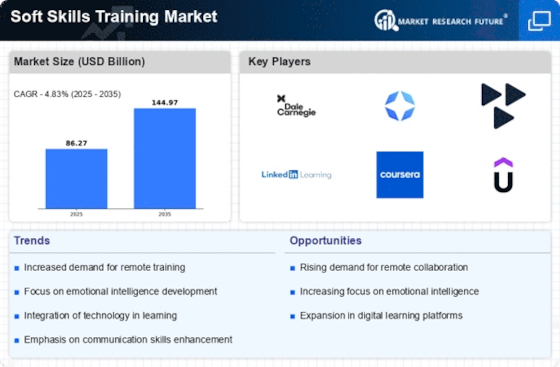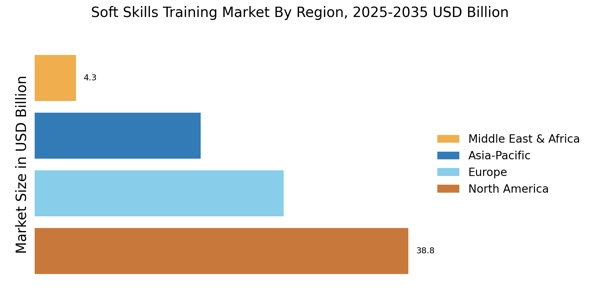Rising Demand for Soft Skills
The increasing recognition of the importance of soft skills in the workplace is a primary driver for the Soft Skills Training Market. Employers are increasingly seeking candidates who possess strong interpersonal skills, adaptability, and emotional intelligence. According to recent data, approximately 92% of employers prioritize soft skills over technical skills when hiring. This trend indicates a shift in hiring practices, emphasizing the need for training programs that enhance these competencies. As organizations strive to improve team dynamics and overall productivity, the demand for effective soft skills training solutions continues to grow. Consequently, training providers are adapting their offerings to meet this demand, leading to a robust expansion of the Soft Skills Training Market.
Globalization and Diverse Workforces
The increasing globalization of businesses is a significant driver for the Soft Skills Training Market. As companies expand their operations across borders, they encounter diverse workforces with varying cultural backgrounds. This diversity necessitates the development of soft skills such as cross-cultural communication, teamwork, and adaptability. Organizations are investing in training programs that prepare employees to navigate these complexities effectively. Data indicates that companies with diverse teams are 35% more likely to outperform their competitors. This competitive advantage underscores the importance of soft skills training in fostering an inclusive workplace culture. As a result, the Soft Skills Training Market is likely to see continued growth as organizations prioritize training that enhances employees' ability to work in diverse environments.
Increased Focus on Employee Well-being
The growing emphasis on employee well-being and mental health is influencing the Soft Skills Training Market. Organizations are recognizing that fostering a supportive work environment enhances employee satisfaction and productivity. As a result, there is a rising demand for training programs that equip employees with skills to manage stress, communicate effectively, and collaborate with colleagues. Research indicates that companies investing in employee well-being see a return on investment of up to 4 dollars for every dollar spent. This focus on holistic employee development is prompting organizations to incorporate soft skills training into their professional development initiatives. Consequently, the Soft Skills Training Market is experiencing a surge in demand for programs that address these critical areas.
Regulatory and Compliance Requirements
The evolving landscape of regulatory and compliance requirements is shaping the Soft Skills Training Market. Many industries are now mandated to provide training that includes soft skills development, particularly in sectors such as healthcare, finance, and education. Compliance with these regulations not only ensures legal adherence but also enhances organizational effectiveness. For instance, training programs that focus on communication and ethical decision-making are becoming essential components of compliance training. This trend is driving organizations to seek specialized training providers that can deliver effective soft skills training solutions. As regulatory frameworks continue to evolve, the demand for soft skills training is expected to rise, further propelling the growth of the Soft Skills Training Market.
Technological Advancements in Training Delivery
The integration of technology into training methodologies is transforming the Soft Skills Training Market. With the advent of e-learning platforms, virtual reality, and mobile applications, training programs are becoming more accessible and engaging. Data suggests that the e-learning market is projected to reach over 375 billion dollars by 2026, indicating a significant shift towards digital learning solutions. These technological advancements allow for personalized learning experiences, enabling individuals to develop soft skills at their own pace. Furthermore, organizations are leveraging data analytics to assess training effectiveness, ensuring that programs are tailored to meet specific needs. This evolution in training delivery methods is likely to enhance the overall effectiveness of soft skills training, thereby driving growth in the Soft Skills Training Market.

















